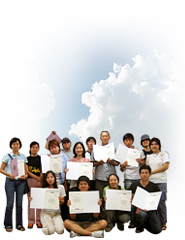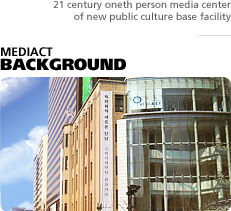|
|
|
|


|
 > English > What is the Media Center > English > What is the Media Center
|
|
  |

The Media Center is part of the public cultural infrastructure, aimed at raising
the nation's media literacy, which is necessary for the 21st century era of
visual information. The Media Center has its own independent film theater, a
'cinematheque' where visitors can watch and talk about a variety of visual
material. Equipped with a wide range of tools used in the digital media envi-
ronment, the Media Center enables professionals and amateurs to produce
their own visual material and to attend media education programs. The Media
Center is also involved in the research, study, collection, management and
preservation of existing media resources. In other words, it is a comprehen-
sive media culture center.
|
 |

Only libraries, museums and art galleries were hitherto regard-
ed as cultural infrastructure, but this is a 20th-century way of
thinking. As early as the mid-20th century, the widespread use
of film as a medium has made spreading media literacy among
citizens an important national policy. This cannot be achieved
through a 'private sector approach,' by a handful with enough
money to buy the equipment and another handful with enough
time to enjoy films.
|
 |
|
The state has built national libraries, museums, theaters and art galleries to provide citizens with opportunities to
enjoy arts and culture, thereby spreading literacy, information acquiring skills and artistic literacy. Likewise, the
state should use public funds to build media centers to take charge of media education aimed at increasing
citizen's capacities to interpret and utilize film media. Currently, independent film organizations and dedicated
teachers are in charge of this much-needed media education, but their activities are sporadic and scattered due
to the lack of focus on education and research. By developing and conducting media education programs, parti-
cularly the production training that forms the core of media education, and by continually introducing citizen-made
works and domestic and foreign independent films, the Media Center will play a critical role in expanding the
scope and depth of media education.
|
  |
 |
The Media Center, based on such themes as public access, independent
film and media literacy, concentrates on education, filming and the provision
of production equipment. By enhancing critical understanding of media and
facilitating the production and distribution of citizen-made contents, the Media
Center will play the role of the local infrastructure in the arena of public media.
To this end, the Media Center will focus on education services in the form
of media literacy programs, public access programs to guarantee citizen par-
ticipation in media production, support for the production of alternative and
critical media contents, and support programs for independent films that act as
the bridge between the Center and general public.
As a multi-player in the media field, the Center will have to work for the advancement of media democracy in the local community.
|
 |
|
 |


 |
The Media Center will be the local base for education on media reading and
making, providing a variety of education programs including media interpreta-
tion, media production for the facilitation of independent films and public ac-
cess, media programs for youths, training for the civic media movement, and
training for Media Center operators.
Each education program is planned by the Media Center and conducted in
partnership with local media organizations or schools. To conduct the
programs, the Media Center provides not only classrooms but also media pro-
duction equipment.
|
|
 |


 |
The advent of viewer participation in program production in aerial, cable and
satellite TV cannot go far without making production equipment and education
available to the citizens. Furthermore, the development of a practical public
access model suited to local conditions and the local residents' proper
understanding of this model are essential to the successful establishment of
a new broadcasting model.
To this end, the Media Center must step up publicity and education on the
significance and usage of public access while offering affordable production
equipment, in order to become the center of participatory democracy in public
access.
|
|
 |


 |
Facilitating independent films at the local level has meaning not only in terms
of facilitating the production of alternative media contents but also in terms of
nurturing production specialists in the cultural industry as a whole and espe-
cially in terms of producing full-time, part-time and volunteer workers special-
izing the various aspects of operating the Media Center.
To this end, the Media Center must offer digital-video-oriented production
equipment and conduct professional production education and human
resource training programs. At the same time, the Center must also establish
a local-based distribution system for independent films that will indirectly
support production by developing programs for continuous screening of inde-
pendent films and organizing various film festivals.
|
|
 |


 |
As the center of media literacy education, as the base for facilitating local
independent films, and as the stronghold for the establishment and facilitation
of a public access system, the Media Center will play a pivotal role in realiz-
ing local media democracy.
The three core concepts of the Media Center in realizing media democracy
are built around three functions: as an education center that provides produc-
tion equipment, conducts education programs and provides media resources,
as a space for exhibition and discussion that focuses on the continuous
screening of independent
|
|
|
|
|
|